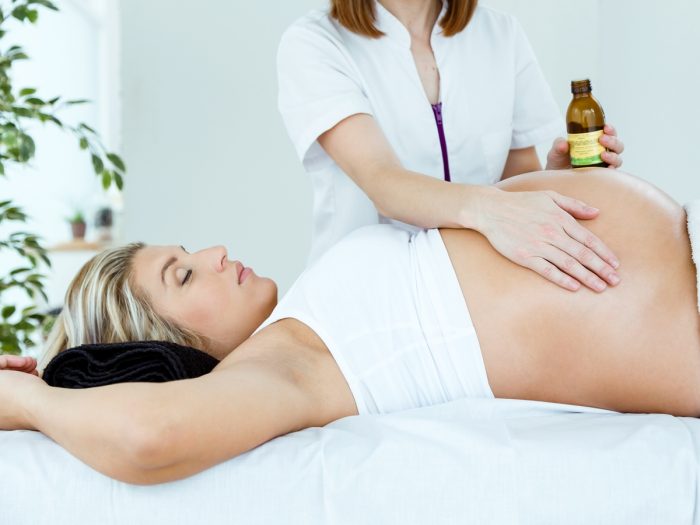There are many things you can’t do during pregnancy but getting a prenatal massage isn’t one of them. In fact, most experts agree that the many benefits – both physical and psychological – of prenatal massage make it an excellent recommendation for expecting mothers. However, there are some exceptions and potential risks, so fully understanding the process, potential health benefits, and possible dangers are very important.
What is a Prenatal Massage?
A prenatal massage is a massage that a pregnant woman gets while pregnant, not directly on the area of the pregnancy, but on the many other parts of the body that are affected by pregnancy. Being pregnant can be extremely taxing on the body, so receiving a relaxing massage of the back, neck, shoulders or legs can be hugely beneficial. This term includes a wide variety of massage types and levels of intensity, the only defining characteristic being that they are applied to a pregnant woman. [1]
While most massage schools offer courses in prenatal massage, it is better to seek out a massage therapist who is specifically certified for prenatal massage. In this way, you can ensure a variety of options for your massage, as well as a competent and safe practitioner.

Therapeutic massage has been used for centuries to improve overall health, reduce stress, and relieve muscle tension, as per the American Pregnancy Organization. Photo Credit: Shutterstock
Is Prenatal Massage Safe During Pregnancy?
Many people ask, can pregnant women get a massage, and the answer is a resounding “YES”. For thousands of years, massage therapy has been used on people with positive effects, including on pregnant women. The basic tenets of a massage, when performed safely, are beneficial for anyone, and the effects apply to a wide range of physical discomforts and conditions. [2]
There are some cases in which prenatal massage is not recommended, and there are some implicit risks that should be considered.
History of Blood Clots
The kneading and rubbing of a massage can help to increase circulation and dislodge blood clots that may have formed in certain parts of the body. This can lead to cardiovascular complications, such as strokes and heart attacks, so if you have heart problems or a history of blood clots, speak to your doctor before receiving a prenatal massage. [3]
Essential Oils
Many massage therapists use essential oils to enhance the experience of the massage, while also imbuing the skin with the natural antioxidants and active ingredients of the source material. The use of most essential oils is widely prohibited during pregnancy, so it is usually best to request that no essential oils are used during your massage. [4]
Bleeding and Pain
If you have experienced consistent pain or chronic bleeding during pregnancy, a massage may exacerbate this condition, particularly due to its circulation-stimulating properties. [5]
Breast Stimulation
While a massage of your breasts may be soothing and relaxing, it can also trigger uterine contractions, which could be dangerous for your developing fetus.
First Trimester
In the first trimester, prenatal massages are not recommended, as the rate of miscarriages is much higher in the first 12 weeks of pregnancy. While there is not an increased risk of miscarriages as a result of prenatal massage, according to research, this is still a point of concern for mothers and massage therapists.
Pressure Points
Massage therapy largely depends on working to relieve strain on pressure points. However, some pressure points are directly tied to the nerves of the uterus and cervix, so only get a massage therapist who is certified in prenatal massage. [6]
Benefits of Prenatal Massage
Some of the most important benefits of a prenatal massage include reducing anxiety and stress, relieving back pain and inflammation, lowering water retention, improving sleep, boosting mood and strengthening the immune system, among others.
Sleep
Massages have been proven to improve sleep quality in those who regularly receive them, thanks to the release of feel-good hormones during a massage. For frequently sleep-deprived pregnant women, this is one of the best reasons for a prenatal massage. [7]
Pain and Inflammation
Carrying around extra weight, and the physical changes in your body can lead to pain and inflammation in the back, legs, neck, shoulders, and hips. A massage can help ease this discomfort, making life a bit easier during your pregnancy. [8]
Mood Booster
The release of hormones like serotonin and dopamine during a massage can help to improve mood and stave off symptoms of depression during pregnancy. This also makes it ideal in countering symptoms of stress and anxiety, which are quite common in expecting mothers. [9]
Immune System
Massage therapy is intended to detoxify the body and rid it of unwanted buildups. Inflammation also weakens the immune system and leads to more oxidative stress, which can be eliminated with prenatal massage. [10]
Water Retention
Many pregnant women find that in addition to weight gain, they also retain water, but massage therapy can help reduce the amount of water you are holding and redistribute it more evenly throughout the body.
Prenatal Massage in the First and Third Trimesters
Depending on how far along you are in your pregnancy, you may want to pursue different types or intensities of prenatal massage.
First Trimester
During the first trimester, any massage should be gentle and minimal, but unlike the common belief that this is prohibited, early pregnancy massage can be hugely helpful.
Third Trimester
You can undergo more intense prenatal massage later on in your pregnancy, including deep tissue and Swedish massage styles. Furthermore, many certified prenatal massage therapists have customized massage beds that allow you to lay on your stomach!
